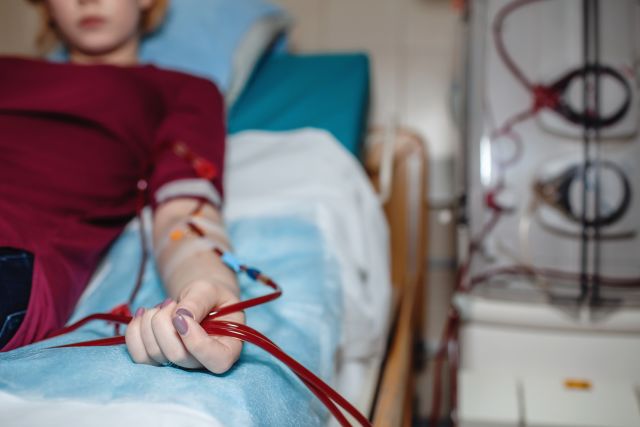The complement system is a part of the immune system, made up of many different proteins that circulate through the body and activate in response to things like infectious pathogens and damaged cells that need to be broken down and cleared away.
Complement-mediated renal diseases are a group of kidney diseases related to abnormal activation of the complement system. One example is complement 3 (C3) glomerulopathy. C3 glomerulopathy is caused by gene mutations, including mutations to the C3 gene that makes complement component 3, one of the proteins of the complement system.
These mutations disrupt the normal functioning of the complement system. The complement system can become active when it shouldn’t, destroying C3 proteins. Fragments of these destroyed C3 proteins can clog delicate blood vessels inside the kidneys. Some research suggests that C3 glomerulopathy may also occur when the immune system begins producing autoantibodies—antibodies that target healthy cells.
What are the symptoms of C3 glomerulopathy?
C3 glomerulopathy damages a part of the kidneys called glomeruli. These are clusters of delicate blood vessels that allow blood to pass through while filtering out excess fluid and unwanted substances that can be expelled through urine. When glomeruli become damaged, blood and protein can end up in the urine, and too much fluid can remain in the body. Symptoms of C3 glomerulopathy can include:
- Blood in the urine (hematuria)
- High levels of protein in the urine (proteinuria)
- Swelling in the lower limbs or other parts of the body (edema)
- High blood pressure (hypertension)
- Decreased ability for the kidneys to make urine (reduced glomerular filtration rate)
- Fatigue
The symptoms of C3 glomerulopathy can vary from person to person. Some people may not experience any symptoms until the disease has progressed significantly.
Preventing progression and complications are important goals of treatment. One of the most serious potential complications of C3 glomerulopathy is end-stage renal disease (ESRD), where the kidneys can no longer function well enough to keep a person alive. ESRD requires treatment with dialysis or kidney transplantation.
How is C3 glomerulopathy diagnosed?
The symptoms of C3 glomerulopathy are common in other kidney diseases. Diagnosis requires a kidney biopsy, where a healthcare team will remove a tissue sample from the kidneys and send it to a lab for examination. A kidney biopsy will also identify what type of C3 glomerulopathy a person has.
There are two types of C3 glomerulopathy—dense deposit disease (DDD) and C3 glomerulonephritis (C3GN)—which have a different appearance when examined with an electron microscope.
DDD is also associated with other diseases besides C3 glomerulopathy. One example is lipodystrophy, a condition where a person lacks healthy amounts of fatty tissue in the upper body. In some cases, DDD is associated with fatty deposits in the retinas of the eyes, called drusen.
How is C3 glomerulopathy treated?
There is no cure for C3 glomerulopathy, and treatment focuses on controlling disease activity, preventing further damage to the kidneys, and preventing complications. A treatment plan can include:
- Medications that reduce immune system activity, such as corticosteroids and immunosuppressive drugs.
- Medications that reduce high blood pressure.
- Dietary changes to monitor intake of sodium and protein, which will be overseen by a healthcare provider such as a registered dietitian.
Medications that reduce the activity of the complement system—called complement inhibitors or anticomplement drugs—are being studied in the treatment of C3 glomerulopathy. These medications are already used in the treatment of other diseases and conditions.
It’s important to mention that kidney disease can contribute to other health problems, including anemia, bone disease, cardiovascular disease, difficulties with memory and thinking, and mental health disorders. These are other important considerations for treatment. Because kidney diseases like C3 glomerulopathy can affect different people in different ways, it’s important to seek care with a healthcare provider who is experienced in treating these types of rare kidney diseases.







